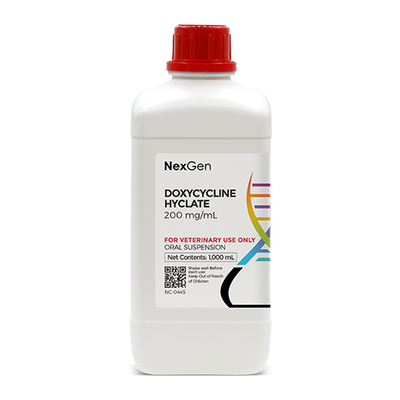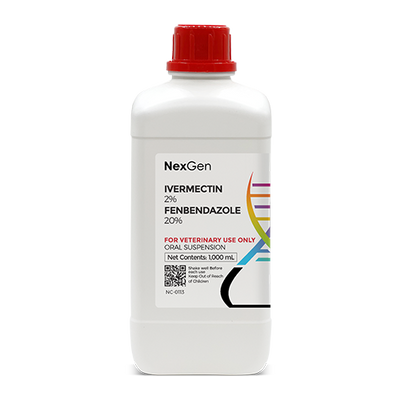
Fenbendazole 200 mg/mL, Oral Suspension, 1000mL
Login for pricing
- Brand
- Mixlab
- SKU:
- NC-0343
- Product Type:
- Suspension
- Size:
- 1000ml
- Administration:
- Oral
Internal parasites are small organisms that live out part of their life cycle within a horse's body, and they have the potential to cause illness. Parasites infect a horse’s specific tissues, organs, and systems, obtaining nutrients from the horse so that they can continue grow, develop and reproduce. There are many species of internal parasites that infect horses, but some of the most common are strongyles, ascarids, tapeworms, pinworms, bots, and threadworms.
Parasitic worms can live in the intestines of most horses, with small numbers of worms being tolerated and causing no demonstrable effect on the horse’s overall health. Larger infestations of intestinal parasites can cause a wide range of problems however, including ill thrift, colic, digestive issues, diarrhea and death.
Horse owners and managers are generally aware that regularly deworming horses is important, but many are unaware of the specific types of parasites that infect horses, and which dewormers (anthelmintics) treat which types of parasites. While nearly all horses have some degree of parasitic infestation, along with other management practices, deworming helps to keep a horse’s internal parasite load low. Doing so lowers the likelihood of clinical disease arising from parasites that are present in the horse. When serious infestations develop however, worms can damage a horse’s intestines and other internal organs, causing irreversible harm and potentially fatal consequences.
The lifecycle of the worm species involved will determine the exact method of transmission of worms to the horse. In most cases, worm eggs are ingested by a horse from an infected pasture and develop inside the digestive tract or lungs, where they may or may not cause disease. Eggs produced by adult worms are then shed in the horse’s feces where they can potentially infect other horses.
Common signs of worm infection in horses can include:
-
Lethargy
-
Loss of weight
-
Loss of condition
-
Diarrhea
-
Colic
-
Lack of appetite
-
Dull coat
A fecal egg count and blood test is the best method for confirming whether or not a horse has worms. These tests will confirm the species of parasite, provide an idea of how many adult worms are in the intestine and give an estimate on how badly a pasture is infested.1
Fenbendazole for Horses
In horses, fenbendazole is labeled for removal of the following parasites: large strongyles (Strongylus edentatus, S equinus, S vulgaris, Triodontophorus spp), small strongyles (Cyathostomum spp, Cylicocyclus spp, Cylicostephanus spp, Cylicodontophorus spp), ascarids (Parascaris equorum) and pinworms (Oxyuris equi). Benzimidazole resistance has been noted in Cyathostomum spp found in the United States.3
In susceptible parasites, fenbendazole’s mechanism of action may be disruption of intracellular microtubular transport systems by binding selectively and damaging tubulin, which prevents tubulin polymerization and inhibits microtubule formation. Fenbendazole has activity against adult life cycle stages of susceptible parasites and may have larvicidal and ovicidal activity against certain parasites.4,5
Where to buy Fenbendazole
Fenbendazole is available in the U.S. through veterinary custom compounding companies. FENBENDAZOLE 200 MG/ML ORAL SUSPENSION, 1000ML by NexGen Pharmaceuticals provides superior relief from parasitic worms in the horse.
This product carries numerous potential drug interactions. Please consult your veterinarian prior to beginning any treatment regimen.
FOR RX ONLY: A valid prescription from a licensed veterinarian is required for dispensing this medication.
3Mason ME, Voris ND, Ortis HA, Geeding AA, Kaplan RM. Comparison of a single dose of moxidectin and a five-day course of fenbendazole to reduce and suppress cyathostomin fecal egg counts in a herd of embryo transfer-recipient mares. J Am Vet Med Assoc. 2014;245(8):944-951.
4Daniels SP, Proudman CJ. Ovicidal efficacy of fenbendazole after treatment of horses naturally infected with cyathostomins. Vet Parasitol. 2016;227:151-156.




















